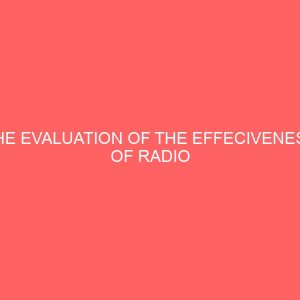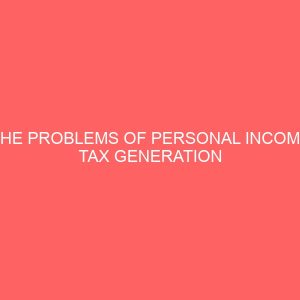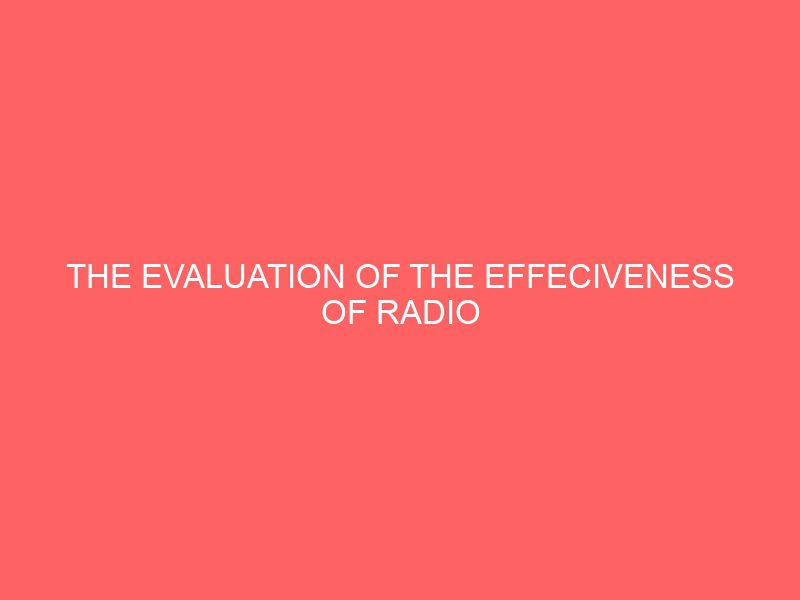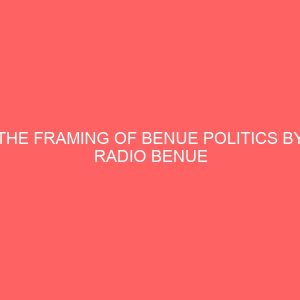Description
CHAPTER ONE
INTRODUCTION
1.1 BACKGROUND OF THE STUDY
Jingles can be traced down to the origin of man. Therefore, it is a phenomenon that has been with the society for a very long time. Although Jingles is so popular, it is difficult to come up with a single and an all embracing definition. However some scholars have proffered some definitions, which will be highlighted in this study.
According to academic’s dictionary of mass communication, compiled by Michael Hoffmann (2007, p.9) “Jingles is a paid, medicated, form of communication from an identifiable source, designed to persuade the receiver to take some action, now or in the future”. Throwing more light on this, the dictionary of business and finance captures it as any form of paid public announcement or presentation, which is aimed at the promotion of the sake of goods and services, or at gaining acceptance for any idea or point of view.
No wonder Okunna (2002, P.99) Jonathan E. Aliede, says in their more recent and widely accepted definition states thus that, Jingles is the non – personal communication of information, usually paid for and usually persuasive in nature about products (goods and services) or ideas by identified sponsors through various media. From the above running background, it is obvious that Jingles from all indication is usually the easiest means to reach the target consumer directly. Therefore, Jingles enables sponsor to reach a substantial segment of their target audience through various media especially print and electronic.
But before casting our research searchlight on the effectiveness of radio Jingle as one of the media on family planning programme Jingle, it is pertinent that we focus this research search light on the history of family planning programme because a people without a history is like a people without a past.
On the other hand, the historical development of man’s desire to control his reproduction is as old as humanity. The WHO (World Health Organization) definition of family planning states that it is a way of thinking and living that is adopted voluntarily based on the knowledge, attitudes and responsible decisions by individuals and couples in order to promotes health and welfare of the family group and thus; contribute effectively to the social development of the country. Egyptians as early as 1850 BC described various methods of birth control in scrolls. Aristotle, A Greek Philosopher in the 4th century B.C stated that the state’s best interest would be served by keeping the population stable. In the early history of African culture, the mother and the infant were separated from the father for prolonged periods of time following childbirths; consequently, this practice ensured a good nutritional period for the infant and abstinence for the mother. The above underscores the fact that family planning is as old as history itself.
In 1797, Jeremy Bentham advocated birth control in England. Giving credence to what Bentham advocated for, Francis place whose dissertation, “Illustrations and proofs of the Principles of Population” published in 1882 made a remarkable impact which proposed contraception to reproduction. Subsequent theories by Thomas Malthins, an Englishman who wrote “An Essay of the Principle of population” in 1798 which stated that poverty was unavoidable because the means of production could not increase as quickly as the population also made an impact.
It is under the above influence that Dr. Aletta Jacobs, in 1881 began the first systematic work in contraception in Holland. She and her medical colleagues gave professional assistance to birth control advocates in other countries. Consequently, their effort saw the light of the day when the first birth control clinic was opened in England by Marie Stopes and society for constructive Birth Control in 1921. Margaret Sanger in her little way in 1916 opened the first family planning clinic, which was closed down 9 days later by the authorities, who were against the consequently was imprisoned. As a result of that, she went on hunger strike for 103 hours. This led the U.S women to demonstrate and make an appeal to the government. These actions led to her release and allowed to carry on with her pioneering work in family planning.
It is from the above background that family planning is defined as; “the control of reckless breeding of children” by Planned Parenthood Federation of Nigeria (PPFN). The questions that are still begging for answer is, has the adequate awareness of family planning been made? If yes, to what extent and how has this awareness affected the life of the public in view? Consequently, the above question cannot be adequately addressed without looking into how this awareness is done. This invites us to stand out and cast a look on how Federal Radio Corporation of Nigeria as our study carries out this awareness task and how effective has been this task? Since the past is always very important in addressing any problem for a better promising future, it is important to trace how the above named institution came into existence. For this would give us a better stand to address the issue at hand.
The FRCN was originally founded in 1933 by the British colonial government, named the Radio Diffusion Service (RDS), it allowed the public to hear the British Broadcasting Corporation’s foreign radio service broadcasts in certain public locations over loudspeakers.
In April 1950, the RDS became the Nigerian Broadcasting Service and introduced ration stations in Lagos, Kaduna, Akungba (Eruwa), Ibadan and Kano. This service was reorganized into the Nigerian Broadcasting Corporation (NBC) on April 1, 1957 by act of parliament. Its mission was to provide as a public service, independent and important broadcasting services. By 1962 the NBC had expanded its broadcast stations into Sokoto, Maiduguri, Ilorin, Zaria, Jos and Katsina in the North; Port Harcourt, Calabar and Onitsha in the East; and Abeokuta, Warri and Ijebu-Ode in the West. Each of these stations was considered a subsidiary station of a regional station.
The subsidiary stations broadcast local interest programs during part of the days and then relayed programming from their regional stations during the rest of the broadcast day. National programs were broadcast from two short wave transmitters and one medium wave transmitter located in Sogunle, near Lagos.
In late 1960, the Federal parliament amended the NBC Ordinance to allow the sale of commercial Jingles. The first ads ran on October 31, 1961, and were broadcast from Lagos. By 1962 regional and provincial broadcasters began selling ads to local businesses. The goal of allowing radio Jingles was to help provide additional funding to NBC stations beyond that received from the government. The Federal parliament approved the creation of the Voice of Nigeria (VON) external shortwave service in 1961. Broadcasting began on January 1, 1961 from Lagos. Its initial operations were limited to two hours a day to West Africa, but by 1963 VON had expanded both its coverage and transmission times with the addition of five additional transmitters.
In April 1961, with financial assistance from the Ford Foundation and technical assistance from the British Broadcasting Corporation, NBC began the National School Broadcasting Service in April 1961. The NBC schools unit broadcast lessons in various school subjects for primary and secondary schools, as well as special programs for teacher training colleges. The schools unit was based in Ibadan. The NBC and the Broadcasting Corporation of Northern Nigeria (BCNN) were merged together in 1978 to become the Federal Radio Corporation of Nigeria (FRCN). Medium wave transmitters previously owned by the NBC were transferred to the individual state governments where the transmitters were located. At the same time, the states transferred short wave transmitters to the FRCN. In 1996, VON installed three power transmitters at its Ikorodu transmitter site, allowing worldwide transmissions for the first time.
FRCN’s medium wave service, Radio Nigeria, has 25 stations located throughout the country and together with voice of Nigeria, considers itself to have the largest radio network in Africa. In 2007, FRCN began introducing FM transmitters in some locations, and plans to begin upgrading and modernizing its shortwave and medium wave transmitters in the coming years. The FRCN is Nigeria’s publicly funded radio broadcasting organization. Among its subsidiaries are the domestic radio network known as Radio Nigeria and the Voice of Nigeria International Radio Service.
1.2 STATEMENT OF THE RESEARCH PROBLEM
For a very long time, Nigerians have been indifferent to family planning. In some cultures, people’s dignity, prestige and power were reflected on the number of wives and children they had. Nigerian government in the past was also unconcerned about family planning as their basic amenities for their citizenry.
According to Nwankwo (1999, P.15). The major factor resulting in rapid population growth is the fact that many couples who would have wanted to limit the size of their family were discouraged by religious or cultural constraints. There are some religious beliefs that discourage any physical or material interference with the laws of nature or God, as children are believed to be gift from God.
Furthermore, culturally Nigerians often say that “it is only God that knows the child that will succeed one”. This saying was as a result of the precarious nature of the health facilities in the past. Then infant mortality rate was high so, in order not to lose the few children one has to measles, cholera, kwashiorkor and other health hazards prevalent then they resulted to having many children thereby throwing the social and economic implication over board. This belief is still in existence till now.
1.3 SIGNIFICANCE OF THE STUDY
This research study is prompted by many factors. Some of these are the continuing interest in and awareness of family planning by Nigerians and also the establishment of more family planning units by the government. The study will also help to determine the extent of knowledge of family planning among radio audience and likewise their attitude towards this programme.
Also the research should help to ascertain the importance of electronic media especially the radio as a media of bringing about people’s awareness of innovations. It will give indications of which medium is most effective in carrying out the Jingle messages. The research will also determine the various social, economic and cultural factors which may influence people’s attitudes towards family planning.
As a result of this study, the researcher hopes to enlighten the Nigerian public more on the benefits one stands to gain from a well planned family. Such benefits includes: increase in standard of living of the whole family; safeguarding of the good health of mother and child and limiting the size of the family to the one they can conveniently cater for. It will assist the government to find possible ways of improving on the family planning policy.
1.4 OBJECTIVES OF THE STUDY
The main purpose of this study is to:
- Identify the implications of escalating population on the entire nation, both socially and economically.
- Formulate population policy to check the situation by the government.
- Find out the perception of the various family planning Jingles on the radio by its audience.
The decision to use the radio is as result of the fact that it is a strong and effective medium employed to make people be aware of innovations and the programmes aired and it does not attract any unit cost to the consumer. Once you posses a portable radio, you can tune into any programme at anytime at extra charge.
What’s more, little effort is needed in getting access to the radio, as consumers do not need to walk or drive about looking for radio programmes. In addition, radio is omnipresent or ubiquitous that is, it can be found everywhere meaning it has a wider coverage than the other media as radio can easily be afforded by an average citizen.
1.5 RESEARCH QUESTIONS
This research study is set to find answers to the following research questions.
- Does the Christian religious doctrines on procreation a factor on the residents of Akungba Metropolis no to see reason or understand what family planning is?
- Does the culture and belief of the Ibos on marriage and child bearing the cause of their difference on family planning jingle?
- Is inadequate message content on family planning Jingle the reason from the apathy of family planning by the residents of Akungba Metropolis?
- To what extent do Jingles on radio influence the public in adopting family planning.
1.6 CONCEPTUAL AND OPERATIONAL DEFINITIONS OF TERMS
– Media: The various means of mass communication considered a whole, including television, radio, magazines and newspapers, together with the people involved in their production.
– Mortality: The state of being human and not living forever.
– Audience: The group of people who have gathered to watch or listen to something e.g a play, concert, somebody speaking etc.
– Population: All the people living in a particular country, area or place.
– Ubiquitous/Omnipresent: Seeming to be in all places.
– Agency: A business or an organization that provides a particular service especially on behalf of other business or organizations.
– Family Planning: The use of birth control methods to choose the number and timing of children born into a family.
– Evaluation: The act of considering or examining something in order to judge its value quality, importance, extent, or condition.
– Mortality: The number of deaths within a particular society and within a particular period of time.
– Agency: Establishments that serve advertisers through the production and placement of Jingles in the media.
– Audience: Radio listeners
– Population: The totality of items or persons from whom data necessary to study are collected.
– Ubiquitous/Omnipresent: Something that is very where.
– Family Planning: The use of contraception to control how many children you have and when you have them.
1.7 ASSUMPTIONS:
Assumption of the study includes the following:
- It assumed that the radio audience will now look up to family planning Jingle programmes to show then a better way of planning their families.
- Secondly, the study will enable the people to know the importance of radio Jingle.
1.8 LIMITATIONS OF THE STUDY:
In the course of conducting this research some hindrances were encountered. The first problem was finance. Since radio audience are scattered across the country the researcher had to go from place to place in order to get different views and opinions. The traveling was capital intensive.
Some of the audience were conservatives and did want to talk about family planning saying that children are not mean to be countered. Also some were too busy to grant the researcher audience and fill out the questionnaires. But despite these problems, the researcher still managed to gathers the required data and analyzed them accordingly without altering the authenticity of the information and quality of the research work.
1.9 SCOPE OF THE STUDY
The study of the effectiveness of radio jingles on family planning programmes is carried out within the Akungba metropolis. The research work is limited to the metropolis because of the high level of ignorance about the family planning programme and therefore would try to emphasize on the way in which radio jingles cpuld help mobilize the community about family planning.








Reviews
There are no reviews yet.